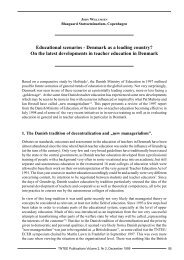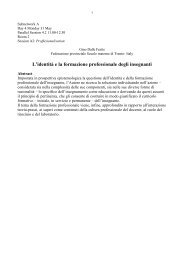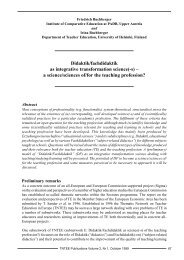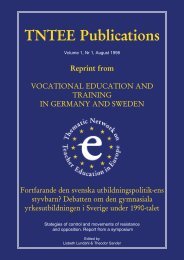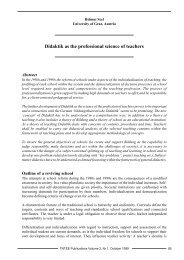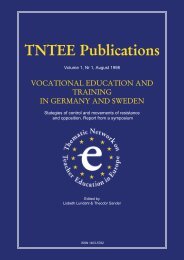TNTEE Publications - Didaktik/Fachdidaktik
TNTEE Publications - Didaktik/Fachdidaktik
TNTEE Publications - Didaktik/Fachdidaktik
You also want an ePaper? Increase the reach of your titles
YUMPU automatically turns print PDFs into web optimized ePapers that Google loves.
Seeking connections between different perspectives on teacher education<br />
likely to attract wide support throughout the teaching profession in England and Wales, which in<br />
itself may prove to be a major obstacle to constructive engagement and future development of the<br />
profession as a whole.<br />
Given such a context it is particularly interesting that the Teacher Training Agency has come to<br />
appropriate the term “pedagogy”. However this has happened without any underpinning theoretical<br />
basis having been elaborated and is illustrative of an atheoretical approach which does not see the<br />
need for an academic aspect to the preparation of teachers. The Chief Executive of the TTA is<br />
reported as seeing pedagogy as ‘the science, the art, the craft of teaching – as central to the issue of<br />
learning effectiveness and, therefore, a prerequisite for school improvement’ (Levis, 1998). However<br />
as Bassey (1998) points out what is ignored, or even unrecognised, is the range of ideological<br />
positions that underpin the practice of teaching. He argues that ‘policy and practice vary according<br />
to whether there is a belief that the most important role of the teacher is to transmit subject knowledge<br />
or to foster the moral, social, creative and intellectual growth of pupils and students’. Similarly one<br />
may hold to the reductionist view of learning, as elaborated long ago by Thorndike, or ascribe to<br />
Vygotsky’s recognition of learning as being concerned with the development of ‘higher mental<br />
functions’.<br />
In reflecting on these developments it is pertinent to consider what, if any, lessons might be learned<br />
to guide future developments. As indicated earlier, the signs from the TTA and OFSTED are not<br />
hopeful in terms of building trust with the teaching profession at this time. Unfortunately the<br />
adversarial and chastising approach has also been adopted by some government ministers, thus<br />
limiting, and possibly even curtailing, chances for constructive engagement with the teaching<br />
profession. However there are more hopeful signs emerging from the Qualifications and Curriculum<br />
Authority (QCA). In discussing the aims of the national curriculum review for schools, the Chief<br />
Executive of the QCA writes that:<br />
In taking forward this agenda, QCA will involve teachers and other partners in the education<br />
service. One lesson we learned from the first version of the current curriculum is that unless there<br />
is shared understanding of why changes are being made, and a commitment to them, they are<br />
unlikely to succeed. The forthcoming revision is a much more limited exercise, but the principle still<br />
applies. The exercise will proceed collaboratively, with full consultation, and on the basis of firm<br />
evidence that it works.<br />
(Tate, 1998)<br />
A particularly encouraging sign is the recognition by the QCA that the National Curriculum for<br />
England and Wales is distinctive for its lack of ‘a clear and explicit rationale’ and associated set of<br />
aims. The lack of a shared sense of purpose is acknowledged and stands in sharp contrast to the<br />
overall aim associated with <strong>Didaktik</strong> of ‘Gebildite’ or ‘educated personality’ comprising (i) ‘in an<br />
egalitarian sense it has to apply to all citizens; (ii) as regards content, it relates to central problems<br />
of living; (iii) is relevant to everybody and may be called ‘key problems’ and (iv) as regards the<br />
human potential it relates to all human capabilities’<br />
(Seel, 1999)<br />
A second hopeful sign, despite the adversarial style, is the start of a debate about what constitutes<br />
pedagogy in England and Wales. In terms of moving the debate forward at this time I wish to<br />
propose a broad understanding of pedagogy, consistent with the ‘continental’ approach so applauded<br />
by the TTA Chief Executive. In particular, I would like to propose the following definition of<br />
pedagogy:<br />
<strong>TNTEE</strong> <strong>Publications</strong> Volume 2, Nr 1, October 1999 45



